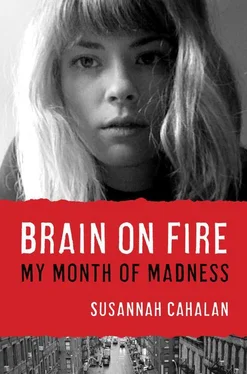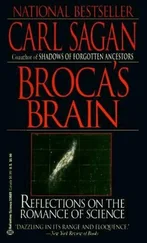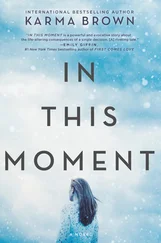When the song “Build Me Up Buttercup” came on, I even did the twist with Stephen. In my mind, I rocked the dance floor, ignoring the aches and pains in my shins and the fact that I was tiring much more quickly than ever before. (I would later learn from my stepfamily, however, that instead of moving like a pro, I just looked robotic and dazed.)
Despite my attempts at seeming blithe and careless, I was hyperattuned to the different ways people were treating me. Since this was a family event, the first question out of everybody’s mouth was, “How are you?” It was an unanswerable question at this stage. But that wasn’t the worst part. It was the falsely enthusiastic, carefully enunciated tone people used; they were talking down to me, as if I were a toddler or a very old person. It was demoralizing, but I couldn’t really blame them. No one had a clue about what was going on inside my mind.
My mother, however, was proud to see me enjoying myself—that is, until another wedding guest broke into her quiet admiration.
“I’m so sorry to hear what happened to Susannah,” the woman said, hugging her. My mother does not like to be touched by strangers.
“Thank you,” she said, trying to keep an eye on me.
“It’s so sad. She’s so different. She’s just completely lost her spark.” At that, my mom tore her eyes from the dance floor and shot the woman a look. There had been many moments of insensitivity, but this was among the worst. “I mean,” the woman continued, “do you think she’ll ever get back to her old self again?”
My mom smoothed out her dress, also pink, and shouldered past the woman, saying through clenched teeth, “She’s doing very well.”
CHAPTER 39
WITHIN NORMAL LIMITS
Although I had already made substantial leaps in my recuperation, nonetheless for many months to come my days would revolve around the candy-colored medications that I had to take six times daily. Each week, my mother spent an hour portioning out my pills into a dispenser that was the size of a shoebox top. Often it took her several tries to get the proportions right because the doses were complicated and always changing. The pillbox was divided into yellow, pink, blue, and green slots and had seven columns for each day of the week and four rows: morning, midafternoon, late afternoon, and bedtime. I was tethered to this pill dispenser.
My reliance on these pills meant I couldn’t be independent, and so I loathed them. Not only were they symbols of my infantile status in my mother’s home, but the pills also made me sleepy and slow. Sometimes I would just “forget” to take them (an incredibly dangerous thing to do). Because I wasn’t wily enough to throw out the medication, I often left the evidence in the dispenser, which tipped off my mother, prompting her to reprimand me as she would a child. In many ways, during that recovery period at my mother’s home, I associated the pills—and the fights they engendered—with her. In a practical sense, I needed her to portion out the pills because it was far too complicated a task for me at the time. In a more emotional sense, though, I began to feel that she, like the pills, embodied my contemptible dependence. I can admit now that I was sometimes cruel to her.
“How was your day?” she would ask me after she returned home from a long day at the district’s attorney’s office.
“Fine,” I would say coldly, without elaborating.
“What did you do all day?”
“Not much.”
“How are you feeling?”
“Fine.”
I cringe when I recall these interactions, since my mom and I had always been inseparable, and I can only imagine how much it must have hurt her. I realize that I was still holding tightly on to an amorphous grudge against her for reasons that seem so meritless now. Though the hospital was a blur, residual anger from that time remained somewhere in my subconscious. Somehow I had convinced myself that she hadn’t spent enough time with me in the hospital, though this was neither fair nor true. On some level, her suffering, which she had buried so deeply, had begun to drain out of her unconsciously and onto me. The worst part was that the struggle didn’t end once the hospital stay was over; now she had to live with this hostile stranger, her own daughter, who had once been one of her closest friends. But instead of sympathizing with her pain, which certainly matched and may have even surpassed my own, I took her suffering as an affront—a sign that she could not handle how flawed the sickness had made me.
She spoke at length about these feelings to Allen but, understandably, kept them hidden from my father. When my parents spoke to one another, they stuck to discussing how I was doing and hardly engaged in any personal or idle chitchat. Every two weeks, however, they reunited to bring me to Dr. Najjar at his office. Each time he would lower my dosages of steroids; next Dr. Arslan would follow suit with the antipsychotics and antianxiety medications, reducing the amounts in tandem with the changing steroid doses. These were uplifting appointments because each time I seemed to progress steadily, and my parents seemed to be getting along better.
Dr. Arslan would always ask the same question: “Out of 100, what percentage do you feel like yourself?”
Every time I answered with confidence, only my blushing face betraying my inner uncertainty: “Ninety percent.” Or, when I was feeling particularly assertive, “Ninety-five percent.”
My father always agreed with me, even if he felt differently. But my mom would sometimes gently interject: “I would say more like 80 percent,” and this was even a stretch, she would later admit.
Though recovery is clearly a relative process (you need to know where you’re coming from to see how far you’ve gone), we would soon get an expert’s view when I attended two evaluation sessions at New York University’s Rusk Institute of Rehabilitation Medicine. I was dreading the trip. Although I was clearly getting better, I didn’t want proof of my continued inability to accomplish simple tasks. But my mom was adamant that I go.
I recall little from the first session because I was too exhausted to be tested. All I remember are the young psychologist’s wide and friendly blue eyes. On the second visit, my mom and dad led me into the Rusk Institute’s room 315, where that same psychologist, Hilary Bertisch, led me into her office. My parents stayed in the waiting area. Dr. Bertisch would later tell me that even at this stage I seemed disconnected from my external world and that I often responded to her promptings so slowly that she wondered if I had heard her at all. In some ways, she said, my behaviors resembled the negative symptoms of schizophrenia: inexpressiveness, blankness, lack of feeling, and monotone and monosyllabic speech.
Dr. Bertisch assessed my concentration and memory by providing a letter cancellation test, in which I had to cross out certain words or letters in a normal-length newspaper article, coincidentally enough. She first asked me to cross out all the h ’s. I got all of them, but it took me 94 seconds, which placed me in the borderline impaired range. Then she had me cross out all the c ’s and e ’s. I missed four of these, and the whole thing took me 114 seconds: borderline again. Then came the hardest part: find each use of and , but , and the on the page. I remember feeling confused and constantly forgetting which words to focus on. Out of the 173, I missed 25. Anything more than 15 is considered “severely impaired.” My speed, accuracy, and concentration were dismal.
She moved on to working memory, which checks the ability to hold information in your mind for a short period of time. She read aloud simple mathematical word problems, which were elementary but that I could solve only at the twenty-fifth-percentile range.
Читать дальше












